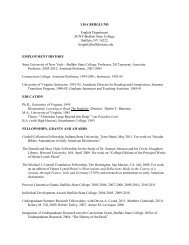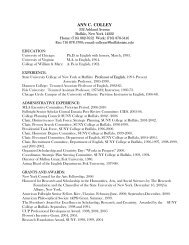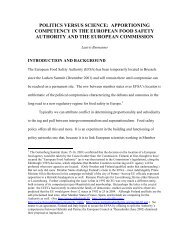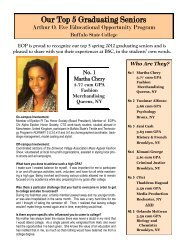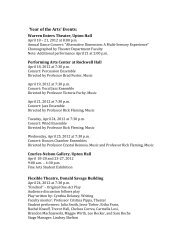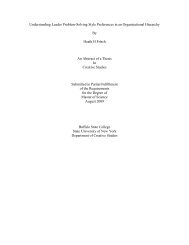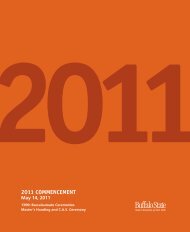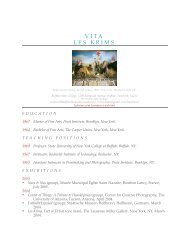Arts - Buffalo State College
Arts - Buffalo State College
Arts - Buffalo State College
Create successful ePaper yourself
Turn your PDF publications into a flip-book with our unique Google optimized e-Paper software.
Change Blindness At the Movies<br />
Ryan Brownell, Lindsay Cosenza, Amanda Grenier, Caley<br />
Wekenmann, Latisha Swanston, Raisa Reyes, Alyssa<br />
Grove, Tessa Bechtoldv Chris Miller, Nolan Przybyciel,<br />
Lauren Stanley, Nick Schultz, Amanda Wasielewski,<br />
DeLeon Hughes, and Jessica Brow, Psychology Club<br />
Faculty Mentor: Professor Stephani Foraker, Psychology<br />
Sometimes we are so focused on one thing going on that we miss<br />
relatively big or important changes going on around us. Researchers<br />
call this “change blindness” and have shown that participants<br />
concentrating on counting basketball passes will not notice a gorilla<br />
walking through that group of people (Simons and Chabris, 1999).<br />
Other studies by Simons and colleagues have looked at color changes<br />
in clothing, background objects gone missing, and changing one<br />
person for another, but there is not much research on how the<br />
magnitude of the change affects its detection. We compared small,<br />
medium, and large changes found in movie mistakes. Participants<br />
watched two small, two medium, two large, and three no-change<br />
video clips two times. After the first time, they just described the<br />
events and whatever they saw. The second time, they were instructed<br />
to look for a change, and describe it in detail. We predict that the<br />
larger the change, the sooner and more often they will be detected.<br />
Women may also detect changes better than men, if they are more<br />
detail oriented.<br />
Presentation Type and Session: Poster II<br />
Changing of the Guard: How Mao and<br />
Nixon Changed Their Ideologies<br />
Jonathan Keenan, SOC 208: Sociology of Contemporary China<br />
Faculty Mentor: Professor Jie Zhang, Sociology<br />
Richard Nixon, former US president and Mao Zedong, former<br />
ruler of China were leaders of their respective countries forming<br />
careers based on the correctness of their ideology and the evilness<br />
of each other. I will study the backgrounds of both politicians to<br />
gain a basic understanding where they began and how they reached<br />
their high positions of influence. From this, I will look into how they<br />
changed over time to creating a co-inhabiting relationship between<br />
these two opposing nations. This diplomatic change was crucial in<br />
setting up Sino-American relations for the rest of the Cold War as<br />
well as into the post-Cold War era. The distinct hatred that formed<br />
after the Chinese Communist Revolution has changed to one of<br />
companionship, beginning with talks between Nixon and Mao. This<br />
is going to be a library archive research from a historical perspective.<br />
Presentation Type and Session: Poster I<br />
Communication Strategies: Recruiting<br />
Students For Study Abroad<br />
Victoria Church, HON 400: All <strong>College</strong> Honors Colloquium<br />
Faculty Mentors: Professor Andrea Guiati, Director, All <strong>College</strong><br />
Honors Program and Professor Pamela Kloc, Communication<br />
Studying abroad provides a valuable educational experience<br />
for students. It allows pupils to travel to new and unique places<br />
Psychology and Social Sciences<br />
while simultaneously advancing their studies. Regardless of<br />
duration or destination, students will benefit from considering<br />
the career implications of their decision to study abroad. <strong>Buffalo</strong><br />
<strong>State</strong> <strong>College</strong> and the SUNY system offer ample opportunities for<br />
students to take advantage of such programs, but they must first<br />
make students aware that those programs exist. Too often, campus<br />
efforts to “internationalize” focus on the academic logistics of<br />
supporting study abroad opportunities. There is not always a careful<br />
and intentional approach taken to providing an integrated effort<br />
to harmonize student support services – principally between the<br />
study abroad and career service offices – to guide a student on the<br />
best way to make their decision to study abroad and become aware<br />
of how the experience may impact their career development. This<br />
project applies techniques used in public relations to examine the<br />
strategies used by the <strong>Buffalo</strong> <strong>State</strong> <strong>College</strong> International Education<br />
Office to attract students to the study abroad programs. It will<br />
include an interview with a member of the International Education<br />
Office as well as a student survey assessing the knowledge students<br />
have of the various programs and suggestions of ways to make<br />
international education more accessible.<br />
Presentation Type and Session: Poster I<br />
Dear Professor, So You Think You’re<br />
Having an Effect On Your Students<br />
Tyler Sutton, PSY 499: Independent Study<br />
Faculty Mentors: Professor Howard Reid, Psychology and Professor<br />
Jill Norvilitis, Psychology<br />
The goal of the present study is to examine if undergraduate<br />
psychology students’ attitudes toward statistics and their views of<br />
psychology as a science change as they progress through psychology<br />
statistics and research methods courses. Previous research has<br />
indicated that within the course of a semester student attitudes about<br />
statistics don’t change, while their knowledge about the subject does.<br />
In addition, research has shown that students who have positive<br />
attitudes towards statistics show higher scores in regards to openness<br />
to experience, and confidence, while math anxiety is inversely<br />
associated with self-efficacy. We plan to examine these personality<br />
measures as well as measures for curiosity and liberalism, and<br />
predict that those students who score higher on psychology as<br />
a science and who have a positive attitude toward statistics will<br />
likely show higher scores on all of these traits. This study will also<br />
manipulate a variable called “mythbusters”. Mythbusters will involve<br />
introducing one class to the results of studies that dispel commonly<br />
held beliefs. We are examining whether this intervention will<br />
influence the way students see statistics. No research exists that deals<br />
with the changing of academic attitudes through the manipulation<br />
of this form of class exercise.<br />
Presentation Type and Session: Poster I<br />
111




